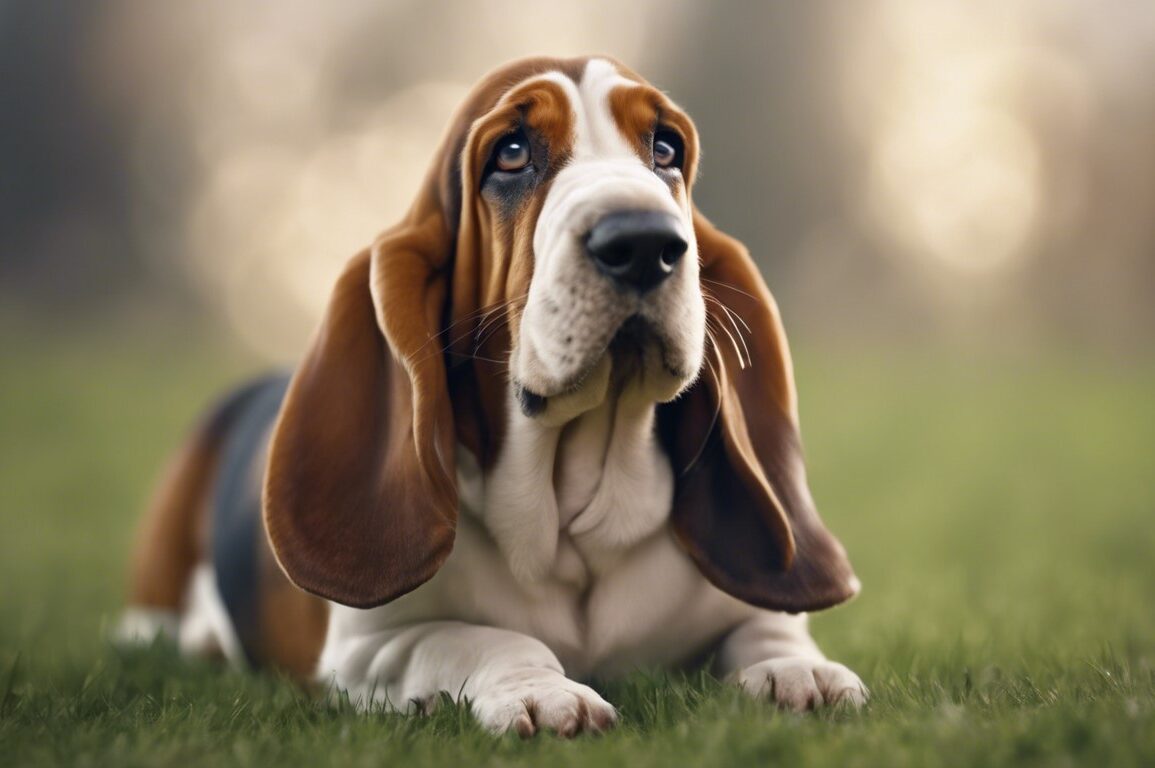As a dog owner, there’s nothing quite like the love and companionship of a loyal canine friend. When choosing a breed, it’s essential to find one that fits your lifestyle and personality. If you’re looking for a dog that is both charming and laid-back, then the Basset Hound might be the perfect match for you. With their distinct appearance, rich history, and gentle temperament, Basset Hounds have captured the hearts of dog lovers worldwide. In this blog post, we will explore the various aspects of owning a Basset Hound, including their appearance, history, temperament, health, exercise needs, training requirements, grooming, and nutrition.
Appearance
When you think of a Basset Hound, the first thing that comes to mind is their unique appearance. These dogs have a long, low-set body with short legs and loose skin that hangs in wrinkles around their face and neck. Basset Hounds are medium to large-sized dogs, typically weighing between 50 to 65 pounds. They have a broad head with a slightly domed skull and large, expressive eyes that melt your heart. One of their most distinctive features is their long, droopy ears that can reach up to their nose when fully extended. Their coat is short and dense, coming in a variety of colors, including tri-color (black, white, and tan), lemon and white, or mahogany and white.
The Basset Hound’s appearance not only adds to their charm but also serves a purpose. Their long ears help to stir up scent particles in the air and direct them towards their nose, aiding in their exceptional sense of smell. This feature, combined with their low-to-the-ground stature, makes them excellent scent hounds and ideal for tracking game, making them popular among hunters.
Despite their unconventional appearance, Basset Hounds are undeniably adorable and have a certain endearing quality that captivates everyone they meet.
History
The history of the Basset Hound can be traced back to 6th-century France, where they were bred by monks in monasteries. These monks were known for their passion for hunting and desired a dog that could track game effectively. Through selective breeding, they developed the Basset Hound’s unique traits, such as their short legs and keen sense of smell. The word “Basset” comes from the French word “bas,” which means low or short, referring to the breed’s low-set body structure.
During the 19th century, Basset Hounds gained popularity in England, thanks to their exceptional hunting abilities. They were primarily used for tracking small game, such as rabbits and hares, as well as larger game, including deer and boar. The breed’s popularity spread across the Atlantic, and by the early 20th century, Basset Hounds had made their way to the United States.
While the Basset Hound’s hunting days are mostly behind them, their charming personality and distinctive appearance have made them beloved family pets and show dogs. Today, they are recognized by various kennel clubs worldwide and continue to win the hearts of dog enthusiasts.
Temperament
Basset Hounds have a reputation for being gentle, friendly, and laid-back dogs, making them ideal companions for families and individuals alike. They have a calm and patient demeanor, which makes them great with children and other pets. Basset Hounds are not known to be aggressive or overly territorial, preferring to enjoy the company of their humans and furry friends.
These dogs are also known for their stubborn streak, which can sometimes present a challenge in training. While they are intelligent, Basset Hounds can have a mind of their own and may not always respond immediately to commands. However, with patient and consistent training, they can learn to follow instructions and be well-behaved members of the family.
Basset Hounds are highly sociable and thrive on human companionship. They do not do well when left alone for long periods and may become bored or anxious, which can lead to destructive behaviors. Regular interaction, playtime, and mental stimulation are essential for keeping your Basset Hound happy and well-adjusted.
Health
Like any breed, Basset Hounds are prone to certain health issues that potential owners should be aware of. One of the most common health concerns in Basset Hounds is obesity. Due to their love for food and their low activity levels, these dogs can easily gain weight if not properly managed. Obesity can lead to a range of health problems, including joint issues, heart disease, and diabetes. It’s crucial to monitor your Basset Hound’s diet and ensure they get regular exercise to maintain a healthy weight.
Another health concern in Basset Hounds is their long, droopy ears, which are prone to infections and ear-related issues. Their ears should be regularly inspected and cleaned to prevent the build-up of dirt, debris, and moisture, which can lead to infections. Additionally, Basset Hounds are prone to certain genetic conditions, such as hip dysplasia, elbow dysplasia, and certain eye disorders. Regular veterinary check-ups and proper care can help catch these issues early and ensure your Basset Hound leads a healthy and happy life.
Despite these potential health risks, Basset Hounds generally have a lifespan of about 10 to 12 years, which is relatively average for medium to large-sized dog breeds.
Exercise
While Basset Hounds may have a low activity level, they still require regular exercise to keep them physically and mentally stimulated. These dogs enjoy leisurely walks, but it’s important to keep in mind that their short legs and long body structure can make them prone to back and joint issues. It’s best to avoid intense, high-impact activities that could strain their bodies.
Interactive play sessions with toys, as well as mental stimulation through puzzle toys or training exercises, can be beneficial for Basset Hounds. They have a keen sense of smell, so engaging their nose with scent-based activities can provide a fulfilling and entertaining experience for them. Overall, aim for a balance of physical and mental exercise to keep your Basset Hound happy and healthy.
It’s worth noting that Basset Hounds can be prone to overheating due to their low-to-the-ground structure and loose skin, which can trap heat. Ensure they have access to shade and fresh water during outdoor activities, especially in hot weather.
Training
Training a Basset Hound can be a rewarding experience but requires patience and consistency. As mentioned earlier, these dogs can be stubborn at times, so it’s important to approach training with a positive and gentle attitude. Harsh or forceful training methods are not recommended and can cause the Basset Hound to become resistant or fearful.
Using positive reinforcement techniques, such as treats, praise, and rewards, can motivate your Basset Hound to learn and obey commands. Keep training sessions short and engaging to hold their attention. Basset Hounds respond well to consistency, so establishing a routine and sticking to it will help them understand expectations.
It’s important to start training your Basset Hound from a young age to establish good behavior habits. Basic commands, such as sit, stay, and come, are essential for their safety and well-being. Additionally, crate training and housebreaking should be a part of their early training process. Seek professional guidance or enroll your Basset Hound in obedience classes if you need assistance or want to further enhance their training.
Grooming
Grooming requirements for Basset Hounds are relatively low maintenance. Their short, dense coat does not require frequent brushing, but a weekly brushing can help remove loose hair and keep their coat shiny. Pay particular attention to their ears, which are prone to wax build-up and infections. Regularly clean their ears using a veterinarian-approved ear cleaner to prevent any issues.
Basset Hounds are moderate shedders, so expect some hair around the house, especially during shedding seasons. Regular bathing, typically every few months or as needed, is sufficient to keep them clean and smelling fresh. Be sure to use a dog-specific shampoo to avoid skin irritation.
Lastly, maintain good dental hygiene by regularly brushing your Basset Hound’s teeth to prevent dental diseases. Additionally, trim their nails as needed and check their eyes for any signs of redness, discharge, or irritation.
Nutrition
Proper nutrition is vital for the overall health and well-being of your Basset Hound. A high-quality, balanced diet that is appropriate for their age, size, and activity level is essential. Consult with your veterinarian to determine the best feeding regimen and portion sizes for your Basset Hound, as individual needs may vary.
It’s important to monitor your Basset Hound’s weight and prevent obesity, as mentioned earlier. Feed them a measured amount of food, divided into two meals per day, to avoid overeating. Avoid free-feeding, as this can lead to excessive weight gain.
Choose a dog food that is specifically formulated for medium to large-sized breeds and meets their nutritional requirements. Look for a food that contains high-quality protein sources, healthy fats, and essential vitamins and minerals. Avoid foods that contain artificial additives, fillers, or excessive amounts of carbohydrates.
Remember to provide fresh, clean water at all times and avoid feeding your Basset Hound table scraps or excessive treats, as this can lead to weight gain and digestive issues.
Conclusion
In conclusion, owning a Basset Hound can bring immense joy and companionship to your life. Their charming appearance, gentle temperament, and unique personality make them a beloved member of many households. However, it’s important to consider their exercise needs, training requirements, grooming, and health concerns before bringing a Basset Hound into your home. With the right care, love, and attention, your Basset Hound will reward you with unwavering loyalty and a lifetime of memories.


